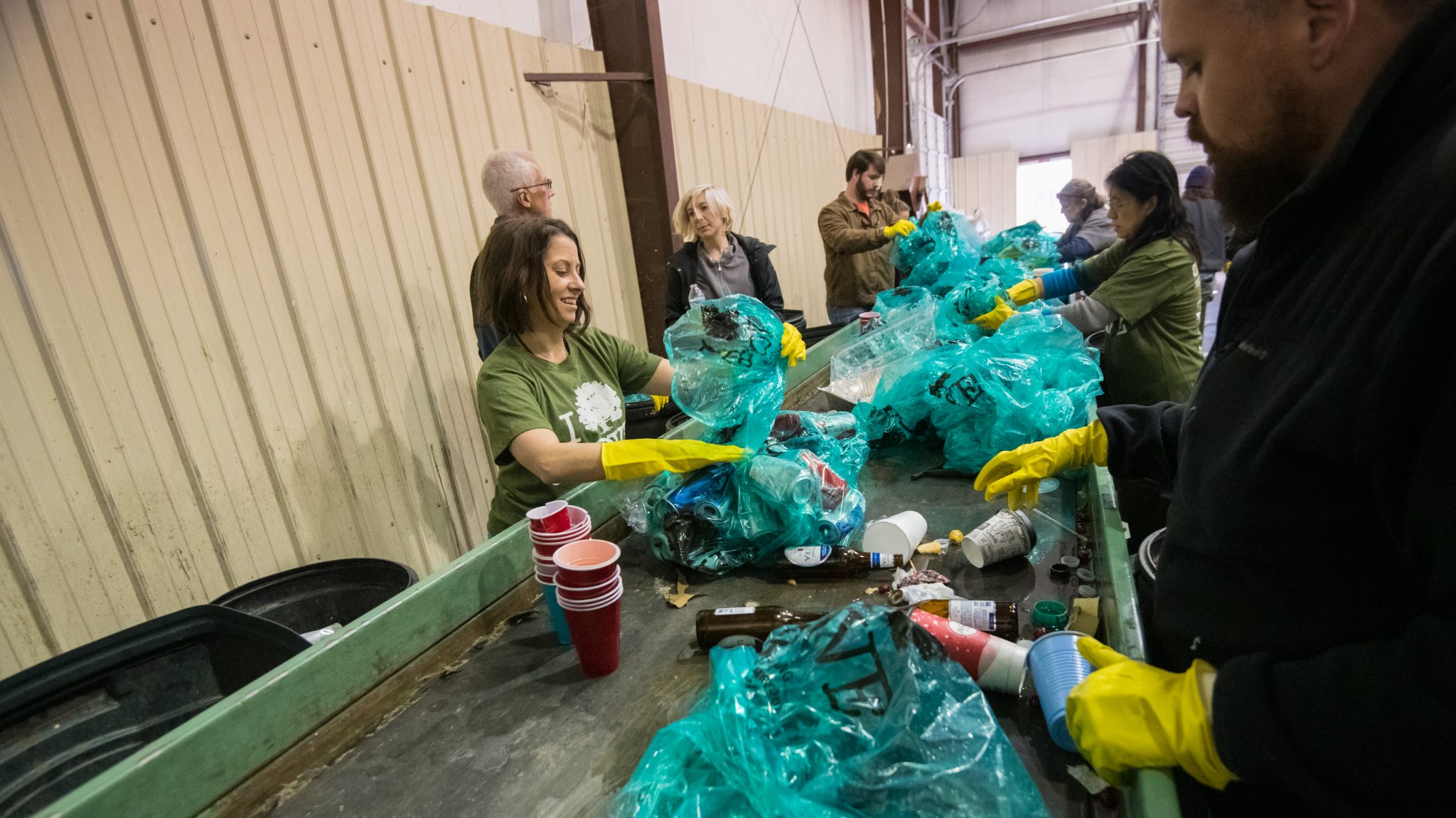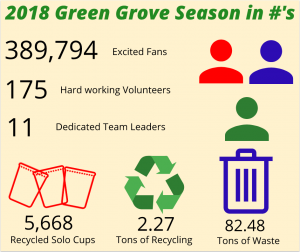
Volunteers with the UM Green Grove program sort through game day trash to pull out recyclable items at the Oxford Recycling Center. This year, volunteers salvaged more than 4,780 pounds of recyclable materials. Photo by Kevin Bain/Ole Miss Digital Imaging Services
This semester, the University of Mississippi’s Green Grove volunteers pulled 4,780 pounds of recyclable cans and plastics from Ole Miss football game-day trash – the equivalent weight of a Ford F-150 pickup truck.
Most people don’t think much about the things they throw away, but the 186 volunteers who participated in the program did the dirty work for everyone’s benefit. They put on plastic gloves and ripped open green bags that had been placed around the Grove on game days. They sifted through the garbage and pulled out recyclables in an effort to unlock the potential of those items to become something else.
Lindsey Abernathy, associate director of the UM Office of Sustainability, which oversees the program, notes the importance of volunteers.
“Each year, tailgating generates hundreds of tons of trash, much of which is likely recyclable,” Abernathy said. “Through Green Grove, we aim to make it as easy as possible to recycle on game day.
“We also see Green Grove as a valuable, hands-on learning experience for our volunteers. We are grateful to everyone who helped reduce our waste this year.”
The Green Grove program was established in 2008, in collaboration with the departments of Landscape Services and Intercollegiate Athletics. Four student interns in the Office of Sustainability, a group of team leaders and hundreds of volunteers manage it annually.
Each year, hundreds of student volunteers help out with the Green Grove program, both through engaging tailgaters on game day and by helping sort the collected recyclables. The students are out of town around the Thanksgiving holiday, when the last home game falls, so Sorts-Giving was created to get Ole Miss staff and community members involved in the efforts.
I decided to participate in Sorts-Giving this year. It wasn’t my first time, and it won’t be the last. Originally I volunteered because my friend, Abernathy, who wasn’t yet the sustainability associate chief, rounded up some volunteers to help out.
I’m supportive of my friends and what they are passionate about, so I was there more to help out a pal instead of being motivated to help the planet. That has changed. My eyes have been opened to the importance of reusing as many things as we can.
Being involved with Sorts-Giving for just a few hours each fall makes me think long and hard about what I trash. It also makes me appreciate the efforts of those who spend time removing items from what we throw away to be recycled. Something good can come from something that otherwise was just going to go into a landfill, lost among the mounds of eyesores on a formerly pristine hill somewhere.
The aluminum cans we recycle become more cans, but also bicycles, airplane parts and even building facades. The ever-so-common water bottles lead me to believe Ole Miss fans are hydrating, which is good. The other positive is that we’re recycling those bottles, which can be turned into more bottles, but also fashioned into fleece jackets, backpacks, carpet and sleeping bags, among other items.
The ever-present red plastic cup, an essential part of Ole Miss tailgating since 1848 – probably; I didn’t Google it – are also recycled through Green Grove by a company called Terracycle. Green Grove recycled 5,668 of them this year.
Not everyone shares my enthusiasm for my recycling, which is concerning.
Perceptions about it can vary widely among communities, according to a survey by the PEW Charitable Trusts. Only three in 10 Americans said their community strongly encourages recycling and reuse. One-fifth said most people in their area don’t really encourage recycling, and the remaining half said they live in places where norms around recycling are in the middle of the survey range.
So, in short, it’s still not really a big deal to most people.
There’s no federal law that establishes it; city or state governments handle any legislation related to it. There’s the U.S. law, the Resource Conservation and Recovery Act, which creates a framework for management of hazardous and nonhazardous solid wastes, but other than that, it’s basically left up to us to do the right thing.
The upshot of these data points is that it is left up to us, so let’s all work together to reduce what we put into landfills for the good of our planet.
